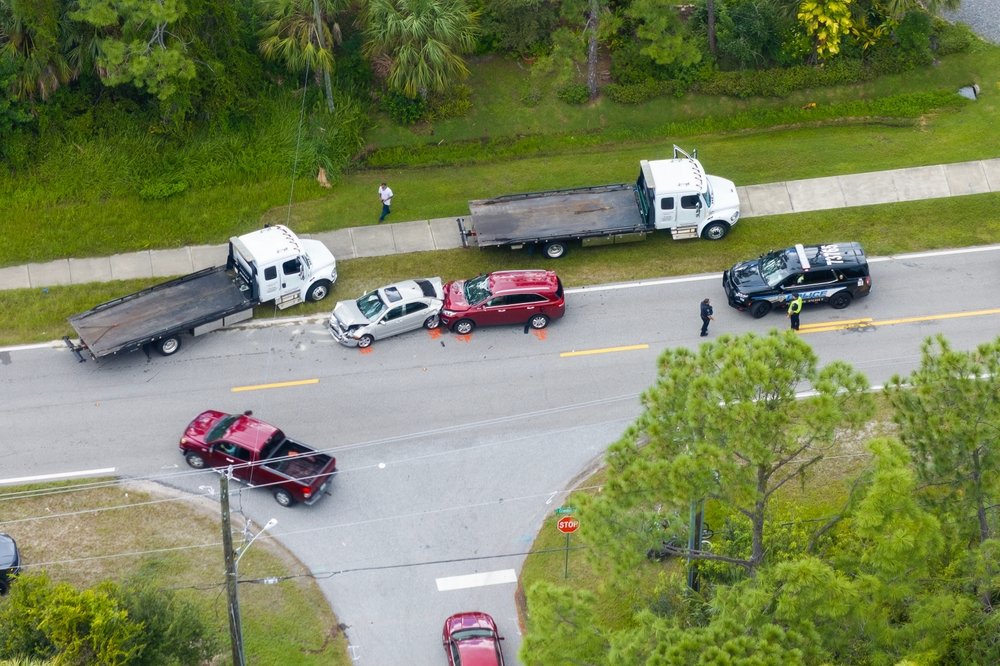Truck accidents are among the most catastrophic and legally complex traffic incidents on the road. These accidents often involve severe injuries, multiple parties, and high financial stakes. A truck accident lawyer plays a critical role in helping victims of such collisions secure compensation, navigate the legal process, and hold responsible parties accountable. But what exactly does a truck accident lawyer do? In this comprehensive article, we will explore the various responsibilities, skills, and processes handled by a truck accident lawyer, and why their expertise is crucial for victims seeking justice.
Understanding Truck Accidents: The Context
Before diving into the specific roles of a truck accident lawyer, it’s essential to understand the complexity of truck accidents themselves. Unlike typical car accidents, truck accidents often involve commercial vehicles such as 18-wheelers, tractor-trailers, delivery trucks, and construction vehicles. These accidents may be caused by factors such as:
- Driver fatigue due to long hours on the road
- Equipment failure or poor maintenance
- Overloaded or improperly loaded cargo
- Distracted driving or driving under the influence
- Violations of traffic or trucking regulations
Due to the size and weight of commercial trucks, accidents involving these vehicles tend to result in more severe injuries, property damage, and even fatalities. Moreover, truck accidents usually involve multiple stakeholders, including the truck driver, trucking company, vehicle manufacturers, cargo loaders, and insurance providers. This web of liability makes truck accident cases far more intricate than standard car accidents.
Initial Consultation and Case Evaluation
The first step a truck accident lawyer takes is conducting an initial consultation with the victim or their family. This meeting is often free of charge and serves to evaluate the merit of the case. During this stage, the lawyer listens to the client’s account, reviews any available documents or evidence, and discusses possible legal options.
A truck accident lawyer will assess several factors during the consultation:
- The severity of the injuries
- The circumstances of the accident
- Evidence pointing to fault or negligence
- Insurance coverage and policies
- The extent of property damage
If the case appears viable, the attorney will move forward with representation, often on a contingency fee basis—meaning the lawyer only gets paid if the client wins the case or receives a settlement.
Investigation and Evidence Collection
Once the lawyer takes on a case, one of their first responsibilities is to conduct a thorough investigation. Unlike car accident cases, where fault may be more straightforward, truck accident cases require deep investigation due to the complexity of liability.
Truck accident lawyers often collaborate with professional investigators and accident reconstruction experts to collect vital evidence such as:
- Police reports
- Witness statements
- Dashcam or surveillance footage
- Black box data from the truck
- Truck driver’s logbooks
- Maintenance and inspection records
- GPS data
- Medical records of the injured party
- Expert testimony
This meticulous collection of evidence helps establish the cause of the accident and identify liable parties. In some cases, more than one party may share the blame, including the trucking company, vehicle manufacturer, and even third-party contractors.
Determining Liability
Liability in truck accident cases can be far more complicated than in a typical accident. A truck accident lawyer works to determine which party—or parties—can be held legally responsible. Possible liable entities may include:
- Truck Driver: If the driver was negligent, fatigued, distracted, or under the influence.
- Trucking Company: If they failed to train drivers, overworked them, or ignored safety protocols.
- Vehicle Manufacturer: If the truck had defective parts or equipment.
- Maintenance Provider: If the truck wasn’t properly maintained.
- Cargo Loaders: If improper loading led to an imbalance or shifting of cargo.
In many cases, trucking companies may attempt to deflect blame or destroy evidence. An experienced truck accident attorney knows how to send preservation letters, demand records, and work within the framework of the law to secure vital information before it disappears.
Navigating Federal and State Regulations
Trucking is a heavily regulated industry, governed by both federal and state laws. The Federal Motor Carrier Safety Administration (FMCSA) sets regulations on hours of service, maintenance, safety checks, and driver qualifications. A knowledgeable truck accident lawyer is well-versed in these regulations and can identify when violations have occurred.
For instance, the FMCSA limits the number of hours a truck driver can operate without rest. If a lawyer discovers that the driver exceeded these limits, it can strongly support the case for negligence. Similarly, if a company skipped routine inspections or failed to maintain brakes or tires, that violation could become a cornerstone of the case.
Understanding and applying these laws effectively is one of the most vital roles a truck accident lawyer plays. Without legal expertise, a victim may overlook critical violations that could significantly affect the outcome of their case.
Calculating Damages
A key responsibility of a truck accident lawyer is determining the value of the victim’s damages. This includes both economic and non-economic losses. Economic damages are those that can be calculated precisely, while non-economic damages are subjective and relate to emotional or physical suffering.
Economic Damages:
- Medical bills (current and future)
- Rehabilitation and physical therapy
- Lost wages
- Loss of earning capacity
- Property damage
Non-Economic Damages:
- Pain and suffering
- Emotional distress
- Loss of enjoyment of life
- Loss of companionship
- Permanent disability or disfigurement
In cases of gross negligence or recklessness, punitive damages may also be awarded. These are designed to punish the offender and deter similar behavior in the future. A seasoned truck accident lawyer can work with economists, medical professionals, and life care planners to ensure that all damages are properly documented and presented.
Negotiating with Insurance Companies
Insurance companies involved in truck accidents are usually well-prepared with strong legal teams. Their primary goal is to minimize payouts and protect their financial interests. Victims who deal with insurance adjusters on their own are often pressured into accepting lowball offers or inadvertently say something that harms their case.
A truck accident lawyer acts as a buffer between the victim and the insurance company. They handle all communication, present evidence of liability and damages, and negotiate aggressively to secure fair compensation. In many cases, the presence of an experienced lawyer alone is enough to push insurance companies to settle more reasonably.
Filing a Lawsuit and Legal Representation
If negotiations fail to result in a fair settlement, the truck accident lawyer will file a formal lawsuit in civil court. This initiates the litigation process, which includes several stages:
- Discovery: Both parties exchange evidence and conduct depositions.
- Pre-Trial Motions: Lawyers may attempt to dismiss claims or narrow the issues.
- Mediation or Settlement Conferences: Courts often encourage both parties to settle before trial.
- Trial: If no agreement is reached, the case proceeds to trial, where a judge or jury renders a verdict.
Throughout the litigation process, the lawyer represents the victim’s interests, prepares legal arguments, examines witnesses, and presents evidence. Their objective is to prove liability and obtain a favorable verdict that compensates the client fairly.
Client Support and Guidance
Beyond the courtroom and negotiations, truck accident lawyers serve as counselors and advisors for their clients. Being in a truck accident is often traumatic and life-altering. Victims may suffer from physical pain, emotional distress, and financial uncertainty. A compassionate lawyer provides reassurance and clarity, helping clients understand their rights and guiding them through each step of the process.
Good truck accident lawyers also help clients access medical treatment, deal with debt collectors, and connect with support services if needed. Their role extends beyond the legal realm into one of genuine advocacy and support.
Contingency Fee Structure
Most truck accident lawyers operate on a contingency fee basis. This means clients do not pay any upfront legal fees. Instead, the lawyer receives a percentage of the final settlement or court award. If the client does not win compensation, the lawyer typically does not get paid.
This model makes legal representation accessible to those who cannot afford hourly legal fees and ensures that the lawyer is motivated to maximize the value of the case.
Real-Life Example
Consider a scenario in which a truck driver fell asleep behind the wheel due to exceeding federally allowed driving hours. The driver crashes into a car on the highway, resulting in severe injuries to the car’s occupants. A truck accident lawyer is hired by the victims.
The lawyer investigates and finds that the trucking company encouraged drivers to ignore rest breaks to meet deadlines. Records are obtained showing that the truck’s black box confirms the hours-of-service violation. The lawyer also uncovers that the truck’s brakes had not been inspected in months.
Armed with this evidence, the lawyer successfully negotiates a multi-million-dollar settlement that covers medical expenses, lost wages, and emotional suffering for the victims. Without the expertise of the lawyer, the victims would likely have received a much lower settlement—or none at all.
Why Hiring a Truck Accident Lawyer is Crucial
Truck accident cases are not just legal disputes—they are battles against powerful corporations, insurance giants, and high-stakes interests. Victims who attempt to represent themselves often face significant disadvantages. The legal system is intricate, and without a knowledgeable advocate, it’s easy to miss deadlines, misinterpret laws, or fall for insurance company tactics.
A skilled truck accident lawyer levels the playing field. They bring resources, knowledge, experience, and a commitment to justice that can mean the difference between a dismissed claim and a life-changing settlement.
Conclusion
A truck accident lawyer is far more than just a legal representative—they are investigators, negotiators, litigators, and counselors. From the moment an accident occurs to the final resolution, these professionals play a pivotal role in ensuring that victims receive the compensation they deserve.
Their work involves intricate legal analysis, strategic planning, and unrelenting advocacy against some of the most powerful players in the transportation and insurance industries. Whether it’s negotiating a fair settlement or fighting in court, a truck accident lawyer’s role is indispensable.
If you or someone you love has been involved in a truck accident, consulting a qualified truck accident attorney should be one of your first steps. Their guidance could help you recover not just financially, but emotionally and physically as well



































